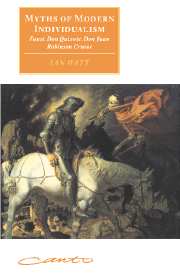Book contents
- Frontmatter
- Contents
- Preface
- Introduction
- Part I THREE RENAISSANCE MYTHS
- Part II FROM PURITAN ETHIC TO ROMANTIC APOTHEOSIS
- 6 Robinson Crusoe
- 7 Crusoe, Ideology, and Theory
- 8 Romantic Apotheosis of Renaissance Myths
- 9 Myth and Individualism
- Part III CODA: THOUGHTS ON THE TWENTIETH CENTURY
- Appendix The worldwide diffusion of the myths
- Index
7 - Crusoe, Ideology, and Theory
Published online by Cambridge University Press: 24 November 2009
- Frontmatter
- Contents
- Preface
- Introduction
- Part I THREE RENAISSANCE MYTHS
- Part II FROM PURITAN ETHIC TO ROMANTIC APOTHEOSIS
- 6 Robinson Crusoe
- 7 Crusoe, Ideology, and Theory
- 8 Romantic Apotheosis of Renaissance Myths
- 9 Myth and Individualism
- Part III CODA: THOUGHTS ON THE TWENTIETH CENTURY
- Appendix The worldwide diffusion of the myths
- Index
Summary
In the Romantic period all four of our myths were widely recognized as having a universal importance, partly at least because they presented individualism as the most desirable human quality. As far as Faust, Don Quixote, and Don Juan are concerned, the original punitive tenor of the Counter-Reformation was transformed into a positive and admiring view of the hero. In this changed form their stories, together with Crusoe's, became main myths of the modern world. The prophet of this vast ideological transformation was, appropriately enough, Jean-Jacques Rousseau.
CRUSOE AND ROUSSEAU
Defoe himself had argued, in a way, for a symbolic interpretation of Robinson Crusoe, but his contemporaries were in general contemptuous of his larger claims: Swift, for instance, sneered that Defoe was “so grave, sententious, dogmatical a rogue, that there is no enduring him.” By the mid-century, however, there was a new note of respect for Defoe's work. The author of The Lives of the Poets (1753), possibly Theophilus Cibber, singled out Robinson Crusoe as “written in so natural a manner, and with so many probable incidents, that, for some time after its publication, it was judged by most people to be a true story.” Later Samuel Johnson delivered the memorable tribute: “Was there ever yet anything written by mere man that was wished longer by its readers, excepting Don Quixote, Robinson Crusoe, and The Pilgrim's Progress.”
Such uninhibited praise shows a surprising degree of recognition of the power of Crusoe's story; but this is nothing to the extent of Rousseau's obsession with the novel.
- Type
- Chapter
- Information
- Myths of Modern IndividualismFaust, Don Quixote, Don Juan, Robinson Crusoe, pp. 172 - 192Publisher: Cambridge University PressPrint publication year: 1996



